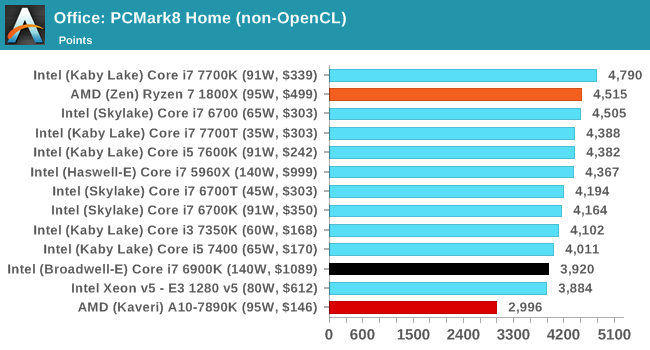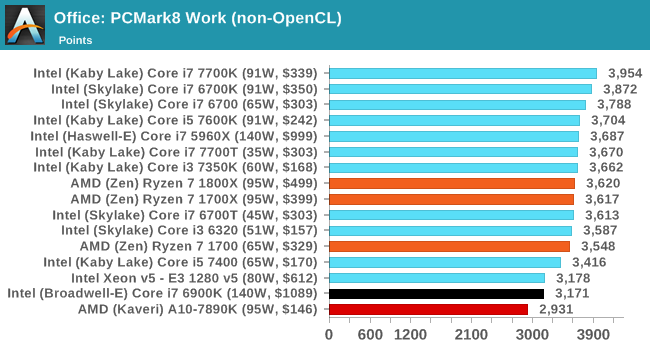The AMD Zen and Ryzen 7 Review: A Deep Dive on 1800X, 1700X and 1700
by Ian Cutress on March 2, 2017 9:00 AM ESTBenchmarking Performance: CPU Office Tests
The office programs we use for benchmarking aren't specific programs per-se, but industry standard tests that hold weight with professionals. The goal of these tests is to use an array of software and techniques that a typical office user might encounter, such as video conferencing, document editing, architectural modelling, and so on and so forth. At present we have two such tools to use.
PCMark8
Despite originally coming out in 2008/2009, Futuremark has maintained PCMark8 to remain relevant in 2017. On the scale of complicated tasks, PCMark focuses more on the low-to-mid range of professional workloads, making it a good indicator for what people consider 'office' work. We run the benchmark from the commandline in 'conventional' mode, meaning C++ over OpenCL, to remove the graphics card from the equation and focus purely on the CPU. PCMark8 offers Home, Work and Creative workloads, with some software tests shared and others unique to each benchmark set. The Creative workload unfortunately seems to fail from the commandline, as the graphical test gives an output of zero (update 3/8: we've found a way around this; will update when we get CPUs retested).


Addendum on 3/8: Originally we posted PCM8 Home scores for Ryzen that were around 3800. On further inspection, these runs were misconfigured due to circumstances beyond our control, and test data is being re-run. The Ryzen 7 1800X in this instance scores 4515.
SYSmark 2014
SYSmark is developed by Bapco, a consortium of industry CPU companies. The goal of SYSmark is to take stripped down versions of popular software, such as Photoshop and Onenote, and measure how long it takes to process certain tasks within that software. The end result is a score for each of the three segments (Office, Media, Data) as well as an overall score. Here a reference system (Core i3-4130, 4GB DRAM, 500GB HDD) is used to provide a baseline score of 1000. A newer version of the benchmark (2014 SE) will be used in future reviews.
A note on contect for these numbers. AMD left Bapco in the last two years, due to differences of opinion on how the benchmarking suites were angled towards Intel processors and had optimizations to show bigger differences than what AMD felt was present. The following benchmarks are provided as data, but the conflict of opinion between the two companies on the validity of the benchmark is provided as context for the following numbers.














574 Comments
View All Comments
lakerssuperman - Thursday, March 2, 2017 - link
People like me. I was previously running a 2600k overclocked. Nice chip. Still runs great, but I was looking for an upgrade about a year ago as one of the things I do a lot of is Handbrake conversion for my HTPC. Going to even the newest Intel 4 core got me maybe 20% improvement on one of my major workloads for insane amounts of money and going to the high end to get 8-10 cores was just not justifiable.I ended up buying a used Xeon/X79 motherboard combo for around $300 off ebay. 8 cores/16 threads and it works great for Handbrake. I lost some clock speed in the move so single thread performance took a bit of a hit, but was more than made up for in multi-thread performance. I can still game on this CPU just fine and I don't play the newest stuff right away anyway just because of time constraints.
The X79 platform is fine for what I'm doing with it. Would I like the new stuff? Sure. And if I was in the position I was last year looking for an upgrade I don't see how I wouldn't get an 1800x. It gives me the right balance of features for what I do with my computer.
If I was just gaming, I'd look at Intel currently because their 4 core i5 is the sweet spot for this. But I'm not just gaming so this chip is infinitely more attractive to someone like me. With the price and features I can't see how it isn't a winner and when the 4 and 6 core parts come out at likely higher frequencies, I think they are going to be the real winners for gaming.
rarson - Thursday, March 2, 2017 - link
Ryzen is clearly well-suited to anyone who values high performance in a multitude of usage scenarios over one single usage scenario, especially if one cares about how much money they need to spend to achieve those results.injurer - Friday, March 3, 2017 - link
1800X is definitely designed for enthusiast, and AMD fans, but when you go to 1700X this is a price killer targeting the mainstream. 1700 is on the same boat but at even lower price. All the 3 are 8 core chips and are quite close to the 6900K but at 2-4 times lower price.At the end I really believe AMD are still having to show us the real potential of their architecture. Those chips are just the start. Remember Ryzen design is a new from its core, so they definitely have room to ecpand and enhance it.
bill.rookard - Thursday, March 2, 2017 - link
Well, thing to remember is that for those looking for a new build, they now have a legitimate choice. I still do see in the future that things will only go more multithreaded, and even though the i7-7700k is still a great chip, having more physical cores and resources to throw at it will only help.To that end, again, anyone planning a NEW build from the ground up will be able to seriously consider a Ryzen system.
Worst case, think about it. In the deep dive they had mention of 'competitive resource sharing' with SMT enabled. If you were to disable SMT on Ryzen - it would give you 8 PHYSICAL cores versus the 4 physical/4 logical cores of the 7700k. Without those resources being partially used across 16 threads - all resources would be allocated to the physical cores instead, potentially allowing more processing power per physical core.
There's still quite a bit to be checked out and dug through.
lilmoe - Thursday, March 2, 2017 - link
This. I want 2 things dug deeper in follow ups:1) Single/multi threaded performance with SMT disabled VS SMT enabled.
2) Game comparisons with more sensible GPUs (which actually ship and sell in volume, IE: the ones people actually buy), like the GTX 1060 and/or RX 480.
BurntMyBacon - Friday, March 3, 2017 - link
@lilmoeI agree with 1). Intel had HT for several generations before it was universally better to leave it enabled (still needs to be disabled some times, but these are more the edge cases now).
Not so sure I'm onboard with 2). Pairing a $200 GPU with a $500 processor for gaming purposes seems a little backwards. I'd like to see that (GTX1060 / RX480) gaming comparison on a higher clocked R5 or R3 processor when they are released.
Meteor2 - Friday, March 3, 2017 - link
I'd rather see tests paired with a 1080 Ti. At RX480/1060 level, it's well known the bottleneck is GPU performance not CPU. A 1080 Ti should be fast enough to show up the CPU.lilmoe - Friday, March 3, 2017 - link
@BurntMyBacon @Meteor2Lots of people, like me, are more into CPU power. I'm OK with a mid-range GPU. Gaming is not my top priority, and when I do, It's never above 1080p.
It'd be interesting to see if there are differences. I wouldn't dismiss it, saying the GPU would be the bottleneck so fast.
bigboxes - Sunday, March 5, 2017 - link
I'm with you on that. Gaming is way down in my priority list. I do it occasionally just because I love to see what my hardware can do. I currently have a ultrawide 1080p monitor. When I move to 4K then hopefully midrange GPU will cover that. My CPU is a 4790K. It's great for most tasks. I've been wanting to go to 6/8 core for some time, but the cost for the platform was too high. I think in a couple of years I will seriously think about Ryzen when building a new workstation.rarson - Thursday, March 2, 2017 - link
I am interested in seeing potential improvement due to BIOS updates. Additionally, I'm interested in seeing potential improvement due to better multi-threaded software. My hunch is that AMD is either on-par or better than Intel, or maybe damn near that prediction, so I think the 4-core parts will compare well to the current Skylake SKUs. I also expect them to overclock better than the 8-core chips. I guess we'll just have to wait for them to release.8 physical cores is definitely better than 4 cores with SMT/HTT/whatever you want to call it.